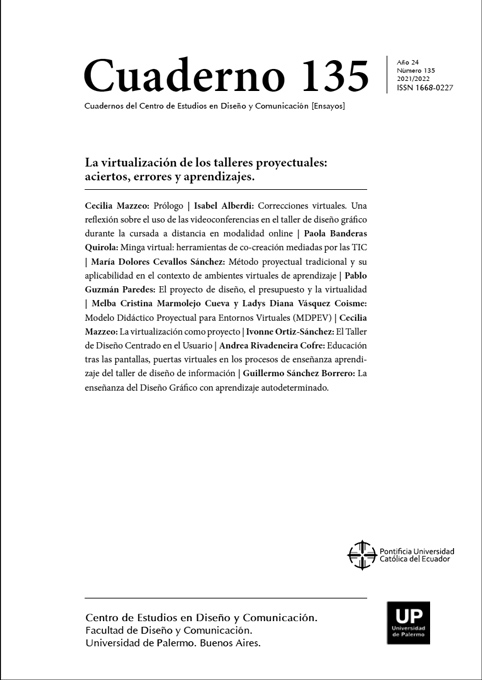La enseñanza del Diseño Gráfico con aprendizaje autodeterminado
Abstract
In 2020, teachers and university students were surprised by the Covid19 pandemic, especially during the first period of the year, in the second, teachers prepare better both in virtual tools and teaching methodologies. In the end, quality results were achieved. This article reflects on the appropriation of learning and didactics of project disciplines in virtual contexts. To analyze the teaching-learning process, the changes in the Design discipline should be considered with a constructivist approach with people-centered research and the importance of the relationship with other disciplines. Pontis and Van der Waarde (2020) develop the concept of heutagogy or self-determined learning that places the student at the center of the educational strategy to motivate the autonomy of learning and methodologically directed research of digital resources and ICTs for adequate use: of time of students, assignments, theoretical readings, resources and Internet content. The project method and integrative project focused on people allows consolidating the transmission of knowledge for meaningful learning, also considering the personal situation of each of the students to intervene in increasingly complex global contexts.
References
Carpintero, C. (2009). Dictadura del diseño. Notas para estudiantes molestos. Wolkowicz Editores.
Contreras Jordán, O. R. (Coord.) y Gutiérrez Díaz del Campo, D. (Coord. ). (2021). El aprendizaje basado en proyectos en educación física. Editorial INDE. https://doi.org/https://elibro.puce.elogim.com/es/ereader/puce/174790?page=11
de Bono, E. (2015). Creatividad: 62 ejercicios para desarrollar la mente. Paidos. e-learning masters. (2019, abril 8). ¿Qué es Padlet y su aplicación en la educación en línea? http://elearningmasters.galileo.edu/2019/03/08/que-es-padlet-y-su-aplicacionen-la-educacion-en-linea/ Eberly Center for Teaching Excellence and Educational Innovation. (s. f.). Formative vs Summative Assessment - Eberly Center - Carnegie Mellon University. Recuperado 21 de abril de 2021, de https://www.cmu.edu/teaching/assessment/basics/formativesummative.html
Frascara, J. (2020). Design Education, Training, and the Broad Picture: Eight Experts Respond to a Few Questions. She Ji: The Journal of Design, Economics, and Innovation, 106-117. https://doi.org/https://doi.org/10.1016/j.sheji.2019.12.003.
Gallego, F. (2001). Aprender a Generar Ideas. Innovar mediante la creatividad. Paidos.
M. Ledo y B. Oliva. (2003). Andragogía. Educación Médica Superior, 17. http://scielo.sld.cu/scielo.php?script=sci_arttext&pid=S0864-21412003000400011#cargo Ministerio de Educación de Ecuador. (s. f.). Educacion en casa. Recuperado 18 de abril de 2021, de https://educacion.gob.ec/educacion-casa-preguntas/
Nigel Cross. (2018). Metodos de diseño: estrategias para el diseño de productos. Limusa.
Noël, G. (2020). We All Want High-Quality Design Education: But What Might That Mean? En She Ji (Vol. 6, Número 1, pp. 5-12). Tongji University Press. https://doi.org/10.1016/j.sheji.2020.02.003
O’Grady, J. / V. (2018). Manual de investigación para diseñadores. Blume.
Ossa, C., & Aedo, J. (2014). ENFOQUES DE APRENDIZAJE, AUTODETERMINACIÓN Y ESTRATEGIAS METACOGNITIVAS EN ESTUDIANTES DE PEDAGOGÍA DE UNA UNIVERSIDAD CHILENA. Ciencias Psicológicas, VIII(1), 79-88. https://doi.org/10.22235/cp.v8i1.1042
Pontis, S., & Van der Waarde, K. (2020). Looking for Alternatives: Challenging Assumptions in Design Education. She Ji: The Journal of Design, Economics, and Innovation, 6(2), 228- 253. https://doi.org/https://doi.org/10.1016/j.sheji.2020.05.005.
Rodríguez, G. (1985). Manual de Diseño Industrial. Curso Básico. (3.a ed.). Gustavo Gili.
Los autores/as que publiquen en esta revista ceden los derechos de autor y de publicación a "Cuadernos del Centro de Estudios de Diseño y Comunicación", Aceptando el registro de su trabajo bajo una licencia de atribución de Creative Commons, que permite a terceros utilizar lo publicado siempre que de el crédito pertinente a los autores y a esta revista.


